#protein myths
Text
I had to relearn what I knew about protein, and through what I learned, I realized we don't actually need that much protein. There's this overemphasis on protein, particularly animal protein. And what I've learned now, at the end of the day, it's not how much protein you're consuming, but how much you're actually assimilating. Because when you're under this kind of protein spell, which was where I was, I forgot about everything else. I forgot about, you know, what about my antioxidants, what about my fiber? I just did not think of that.
- Luke Tan in Let Us Be Heroes - The True Cost of Our Food Choices (2018)
#q#quotes#let us be heroes#the true cost of our food choices#true nourishment#protein myths#protein supplement#fitblr#wfpb#whole food plant based#nutrition#food centric herbalism#food industry#leveling up#holistic leveling up#rda#recommended daily allowance#food science#standard american diet#that girl#green juice girl#sidewalkchemistry
3 notes
·
View notes
Text
How Much Protein do you ACTUALLY need for Bodybuilding?
Figuring out how much protein you need is tough. For folks that body build, it can be even tougher. Your weight, gender, protein quality and content (be it animal vs plant), workouts etc all have factors that need to be considered. Seriously, how much protein do you ACTUALLY need for bodybuilding?
Fueling your body for maximum muscle growth is a complex game, and protein often takes center…

View On WordPress
#bodybuilding#bodybuilding myths#exercise#fitness#gym#health#myths#natural bodybuilding#nutrition#one gram per pound#protein#protein for bodybuilding#protein myths#texas#texas bodybuilding#training#workout#workout myths
1 note
·
View note
Text
Protein Rich Indian Vegetarian Food - The Ultimate Guide
Introduction
Definition: What is Protein and Why Is It Essential for Our Bodies?
You’ve heard the word ‘protein,’ but do you know what it truly means for your health, especially when considering Protein Rich Indian Vegetarian Food? Simply put, proteins are the building blocks of life, made up of vital amino acids. These compounds are essential for everything from cellular repair to immune…
View On WordPress
#Dietary Requirements#Fruits and Vegetables#Health#High-Protein Diet#Indian Vegetarian Cuisine#Legumes#Meal Planning#Nutrition#Nuts and Seeds#Plant-based Proteins#Protein#Protein Intake#Protein Myths#Protein Sources#Protein-rich Foods
1 note
·
View note
Text
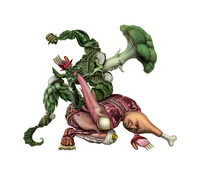
ARE THE BROCOLLI AND THE CHICKEN LEG FUCKING???
#rubia speaks#art piece is Protein Myth by Armando Veve btw#saw it in a writing book asking what i notice first I NOTICE THAT THEY'RE FUCKING.
1 note
·
View note
Text
Debunking Common Nutritional Myths and Misconceptions
Explore and debunk common nutritional myths and misconceptions in our comprehensive guide. Make informed choices for a healthier lifestyle. #nutrition #cleaneating
Let’s debunk some common nutritional myths to level up our good health.
In our quest for health and wellness, accurate nutritional information is like a compass guiding us through a sea of choices. This article highlights the often confusing and contradictory world of nutrition by tackling nutritional myths and misconceptions head-on. It’s surprising how these myths can shape our daily…

View On WordPress
#carbs#clean eating#eat clean#fats#good nutrition#macros#Nutrition#nutritional myths#organic food#produce#protein
0 notes
Text
The Ethical Vegan Diet: More Sustainable Future

Introduction:
The ethical vegan diet is gaining popularity for its focus on compassion and sustainability. Ethical vegans abstain from consuming animal products, aiming to eliminate harm directed towards animals while supporting a more environmentally-friendly food system. This article will delve into the principles of Ethical vegan eating, highlighting the ethical and environmental consequences of animal agriculture. Furthermore, we will explore the health benefits associated with adopting an ethical vegan diet and provide practical tips for implementing this lifestyle choice.
The Ethical Implications of Animal Agriculture:
Animal agriculture is a primary contributor to various ethical dilemmas surrounding animal rights. The factory farming industry subjects animals to overcrowded, unsanitary living conditions and inhumane treatment. Ethical vegans argue that all sentient beings have an inherent right to life, freedom, and protection from unnecessary suffering. By avoiding animal products, ethical vegans refuse to support an industry that promotes cruelty and exploitation.
Additionally, the widespread use of antibiotics and hormones in animal agriculture poses significant health risks. Routine use of antibiotics leads to the emergence of antibiotic-resistant bacteria, jeopardizing public health. Ethical vegans advocate for a food system that prioritizes the well-being of both humans and animals, highlighting the need for a shift towards plant-based alternatives.
Environmental Benefits of Ethical Veganism:
Beyond ethical concerns, adopting an ethical vegan diet also has significant environmental benefits. Animal agriculture is a major contributor to deforestation, greenhouse gas emissions, and water pollution. Livestock farming requires vast amounts of land, leading to the destruction of ecosystems and loss of biodiversity.
Furthermore, the process of rearing animals for food is extremely resource-intensive, requiring substantial water usage, feed production, and transportation. Animal agriculture is responsible for a significant portion of global greenhouse gas emissions, primarily due to methane released by livestock. By choosing to consume plant-based alternatives, ethical vegans reduce their carbon footprint and contribute to a more sustainable future.
The Health Aspect of Ethical Veganism:
Contrary to common misconceptions, an ethical vegan diet can meet all nutritional requirements. Well-planned vegan diets can be nutritionally adequate and provide all essential vitamins, minerals, and macronutrients needed for optimal health. Plant-based diets are rich in fiber, vitamins, and antioxidants, which can help in reducing the risk of chronic diseases such as heart disease, diabetes, and certain types of cancer.
However, to ensure adequate nutrient intake, ethical vegans need to pay attention to certain nutrients like vitamin B12, omega-3 fatty acids, iron, calcium, and zinc, which are commonly found in animal products. These can be obtained through vegan-friendly fortified foods, supplements, or careful selection of plant-based sources.
Practical Tips for Adopting an Ethical Vegan Lifestyle:
Transitioning to an ethical vegan diet can be a gradual process. Start by incorporating more plant-based meals into your routine and experimenting with various fruits, vegetables, grains, and legumes. Educate yourself about plant-based nutrition and seek guidance from registered dietitians or nutritionists to ensure a balanced diet.
Explore the wide variety of vegan alternatives available, such as tofu, tempeh, seitan, lentils, and nut-based milks. Experiment with different cooking techniques and flavor combinations to discover delicious plant-based meals.
In addition to diet, ethical veganism extends to the use of animal-derived products like clothing, cosmetics, and household items. Opt for cruelty-free and vegan alternatives whenever possible, avoiding products that have been tested on animals or contain animal-derived ingredients.
Conclusion:
Adopting an ethical vegan diet aligns individual food choices with moral principles, promoting compassion for animals and environmental sustainability. Through eliminating animal products, ethical vegans prioritize the well-being of all sentient beings and minimize their environmental impact. By understanding the ethical implications of animal agriculture and acknowledging the numerous health benefits associated with plant-based diets, individuals can make informed choices that promote a more compassionate and sustainable future. Please visit here Ethical vegan eating for more information.
#Factory farm animal cruelty#Vegan diet benefits#Unnecessary meat consumption#Dairy industry dangers#Meat industry hazards#Animal abuse in agriculture#Health benefits of veganism#Climate change and meat#Antibiotic resistance farming#Ethical vegan eating#Sustainability and veganism#Plant-based protein sources#Deforestation and meat industry#Debunking protein myth#Meat#dairy health risks#Greenhouse gas emissions farming#Dairy industry animal cruelty#Vegan diet sustainability#Environmental meat industry costs#Animal welfare and veganism
0 notes
Text
Top 10 Myths On Consumption Of Protein Supplements.
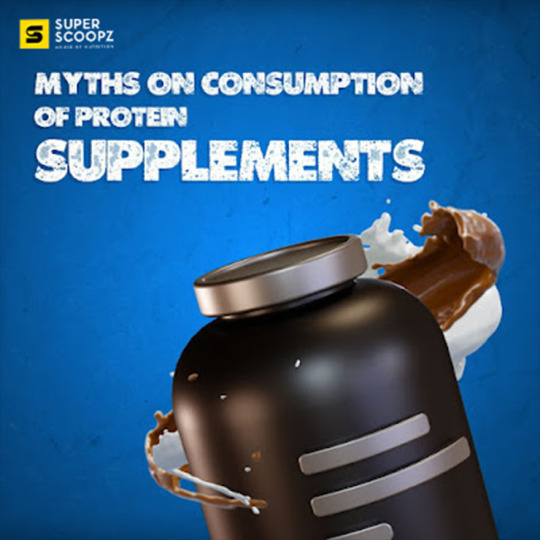
When it comes to maintaining and building a lifestyle, protein plays an important role in our diets. We’re all trying to get the most out of our workouts, and one of the methods that has been touted as a surefire way to get results is through supplemental protein. But with so much conflicting advice out there, how can we know if these products are really helping us or not? In this article we’ll take a look at the top 10 myths about protein supplements and provide insights into how you can determine what will work for you. Read on to find out more!
What Are Protein Supplements?
Protein supplements are powders or shakes that contain concentrated amounts of protein. They are usually derived from milk, eggs, or soy, and are often used by bodybuilders and other athletes to help them build muscle mass. Protein supplements can also be used by people who are trying to lose weight, as they can help to promote satiety and prevent overeating. However, there is no evidence to suggest that protein supplements are necessary for most people, and they can actually be harmful if consumed in excess.
Top 10 Myths On Consumption Of Protein Supplements
Myth: Whey protein supplements can only be consumed post-workout.
Fact: While consuming whey protein post-workout can be beneficial for muscle recovery, it can also be consumed at any time throughout the day to increase protein intake and support overall health and wellness. It's important to spread your protein intake evenly throughout the day to support muscle growth and repair.
Myth: Whey protein supplements will make you bulk up.
Fact: Consuming whey protein alone will not cause significant muscle growth. In order to bulk up, a combination of resistance training and adequate calorie intake is necessary. Additionally, muscle growth is also influenced by several other factors such as genetics, age, gender, hormone levels and overall lifestyle. Consuming whey protein supplements alone will not make you bulk up, it will aid in muscle recovery and repair but you need to follow a proper workout routine and eat enough calories to see muscle growth.
Myth: All whey protein supplements are created equal.
Fact: Not all whey protein supplements are created equal. Some supplements may be of lower quality, contain fillers, or have added ingredients that can be harmful to your health. It's important to read the label and do some research before purchasing any whey protein supplement. Always look for brands that have a good reputation, certifications, and has been third-party lab tested. Also, check the ingredients list and avoid any supplement that has artificial sweeteners, colors, or preservatives.
Myth: Whey protein supplements can cause kidney damage.
Fact: While a high protein diet may not be ideal for people with pre-existing kidney issues, a healthy individual's kidneys are able to process a normal amount of protein without any negative effects. Studies have shown that healthy individuals who consume whey protein supplements do not experience any kidney damage. However, it is always a good idea to speak with a healthcare professional before starting any new supplement regimen, especially if you have pre-existing kidney issues or other health concerns.
Myth: Whey protein supplements are only for people who are lactose intolerant.
Fact: Whey protein supplements are suitable for lactose intolerant people as they are low in lactose content. However, not all whey protein supplements are lactose-free, so it's important to check the label and consult with a doctor if you are lactose intolerant. Some whey protein supplements are specifically formulated to be lactose-free, and others may contain a small amount of lactose. For people who are lactose intolerant, it's recommended to opt for whey protein isolate or hydrolysate which contains less lactose than whey protein concentrate.
Myth: Whey protein supplements will increase cholesterol level.
Fact: Studies have shown that whey protein supplements do not have a significant effect on cholesterol levels, and may even have a beneficial effect on cholesterol levels. Studies have shown that consuming whey protein supplements can improve cholesterol levels by decreasing the "bad" LDL cholesterol levels and increasing "good" HDL cholesterol levels. However, it's important to remember that high cholesterol levels can also be caused by other factors such as diet, exercise, and genetics. It's always a good idea to consult with a healthcare professional before starting any new supplement regimen, especially if you have pre-existing cholesterol issues or other health concerns.
Myth: Whey protein supplements are expensive
Fact: While some whey protein supplements can be expensive, there are many affordable options available on the market. Many brands offer discounts and sales, and you can also find whey protein supplements in bulk which can be more cost-effective. Additionally, you can also compare prices between different brands and retailers to find the best deal. It's also important to remember that the cost of a protein supplement is not the only factor to consider, the quality and purity of the product should also be taken into account.
Myth: You can only consume whey protein isolate.
Fact: Whey protein isolate is one form of whey protein supplement, but whey protein concentrate and whey protein hydrolysate are also available options. Each type of whey protein has its own unique properties and benefits.
Whey protein isolate is a pure form of whey protein and contains 90% or more protein, with minimal amounts of lactose, fat, and cholesterol. It is a good option for people who are lactose intolerant or looking for a low-carb option.
Whey protein concentrate is less processed than isolate and contains a higher amount of fat and lactose. It is also less expensive than isolate.
Whey protein hydrolysate is pre-digested and partially hydrolyzed, making it more easily absorbed by the body. It is a good option for people who have a sensitive stomach and looking for a fast-acting protein source.
It's important to understand the different types and choose the one that best suits your needs, whether it's based on taste, cost, or dietary restrictions.
Myth: You can consume too much whey protein.
Fact: While it is possible to consume too much protein, it is not likely for the majority of people to consume too much protein in their diet, including whey protein. The recommended daily protein intake for adults is 0.8 grams of protein per kilogram of body weight. Consuming more than this amount may not provide any additional benefits and may even have negative effects on health, such as kidney damage in individuals with pre-existing kidney issues. It's important to monitor your protein intake and speak with a healthcare professional if you have any concerns
Myth: Whey protein supplements are not needed if you eat enough protein in your diet.
Fact: While a well-rounded diet can provide all the necessary protein, wheyprotein supplements can be a convenient and easy way to increase protein intake and support muscle recovery and growth. Additionally, some individuals may have difficulty consuming enough protein through diet alone, such as vegetarians or people with certain medical conditions. For those individuals, whey protein supplements can be a useful tool to help ensure they are getting enough protein to support their health and fitness goals. It's important to remember that a balanced diet should be the primary source of nutrients and supplements should be used to complement it.
Bottom Line!!
Protein supplements can be very beneficial for people who are looking to gain muscle mass or maintain their weight. However, there are many myths surrounding the consumption of such supplements that are not supported by any scientific evidence. We hope we have cleared up some of these common misperceptions and provided you with a better understanding of what protein supplementation is all about. Always consult your doctor if you’re considering taking any kind of supplement, but don’t let misinformation stop you from getting the benefits that supplementing with protein can bring.
#Tags-protein supplements#protein supplement myths#protein absorption myth#myths of whey#protein myth#protein myth bodybuilding
0 notes
Text
It might take a long time to lose weight. Because your weight fluctuates by little amounts, the procedure is often not linear.
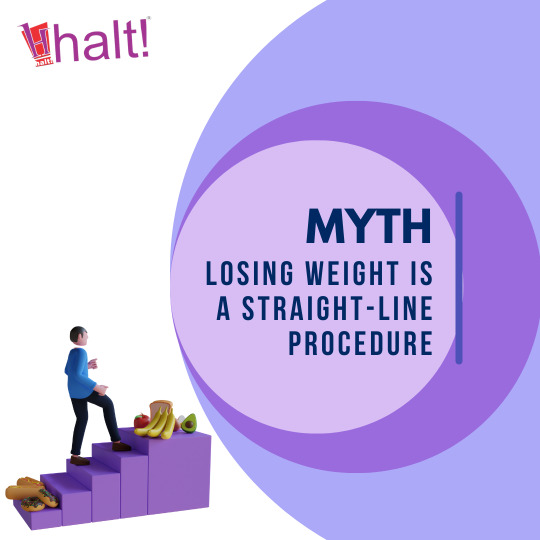
0 notes
Text
Whey Protein Myths Debunked: Separating Fact from Fiction
Whey protein is a popular dietary supplement among fitness enthusiasts, athletes, and health-conscious individuals. While it is known for its ability to help build muscle mass, there are several misconceptions surrounding its usage and effectiveness. In this article, we will debunk some of the most common whey protein myths and separate fact from fiction.

Myth #1: Whey protein is only for bodybuilders.
This is a common misconception that needs to be cleared up. While whey protein is popular among bodybuilders and weightlifters, it is not exclusive to them. In fact, whey protein can benefit anyone looking to build lean muscle mass or improve their overall health and wellness. Whey protein can also help individuals who are recovering from an injury or surgery and need to rebuild their muscle strength.
Myth #2: Whey protein causes kidney damage.
This is a persistent myth that has been circulating for years. The truth is that there is no scientific evidence to support this claim. Several studies have shown that whey protein consumption does not cause kidney damage in healthy individuals. However, individuals with pre-existing kidney problems should consult with their healthcare provider before consuming whey protein.
Myth #3: Whey protein is only effective immediately after a workout.
While it is true that consuming whey protein immediately after a workout can help with muscle recovery and growth, it is not the only time when whey protein can be effective. Consuming whey protein throughout the day can help maintain a positive protein balance and promote muscle growth. It is also an excellent source of protein for breakfast or as a snack between meals.
Myth #4: Whey protein causes acne.
There is no scientific evidence to support the claim that whey protein causes acne. However, individuals who are prone to acne may experience breakouts due to the increased consumption of dairy products, which whey protein is derived from. If you are prone to acne, consider using a non-dairy protein supplement, such as pea or soy protein.
Myth #5: Whey protein is not for women.
This is another common misconception that needs to be addressed. Whey protein is not exclusive to men and can benefit women in the same way. In fact, consuming whey protein can help women maintain muscle mass, improve bone density, and support healthy aging. (QNT Prime Whey is a triple blend whey protein highly I adore.)
Myth #6: All whey protein powders are the same.
Not all whey protein powders are created equal. Whey protein can be processed in several ways, including concentrate, isolate, and hydrolysate. Each form of whey protein has a different protein content and level of processing, which can affect its quality and effectiveness. There are different blends like prebiotic whey protein etc. It is important to choose a high-quality whey protein powder that is free from fillers and additives.
In conclusion, whey protein is an excellent source of protein that can benefit anyone looking to improve their muscle mass, overall health, and wellness. However, it is important to separate fact from fiction when it comes to whey protein usage and effectiveness. By debunking these myths, individuals can make informed decisions about whether whey protein is right for them and how to use it to maximize its benefits.
0 notes
Text
Protein Shake and Protein Powder: Myths and Realities
Introduction:
Protein shakes and protein powders have become ubiquitous in the fitness and nutrition industry. Many people rely on these supplements to enhance their workouts, build muscle mass, and improve their overall health. However, there are also many misconceptions and myths surrounding protein shakes and protein powder, which can confuse and mislead consumers. In this article, we’ll…

View On WordPress
#bodybuilding#Fitness#muscle gain#myths#Nutrition#protein powder#protein shake#realities#weight loss
0 notes
Text
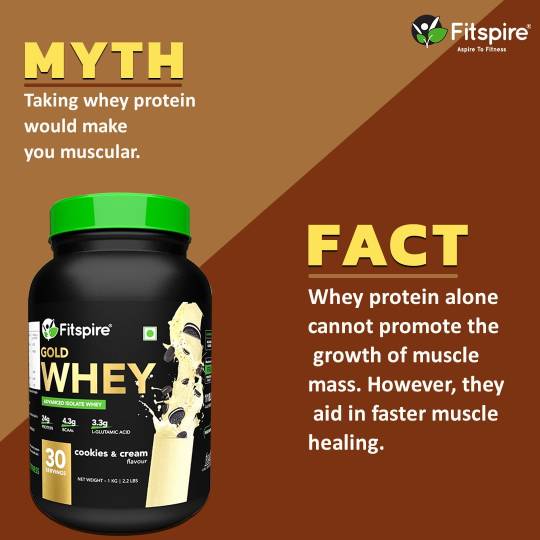
Fitness myths are common misconceptions or misinformation about exercise and physical activity. These myths can often lead people to engage in ineffective or even harmful exercise practices or discourage them from pursuing physical activity altogether.
0 notes
Text
Myth: Muscle tissue turns fat when it isn't utilized
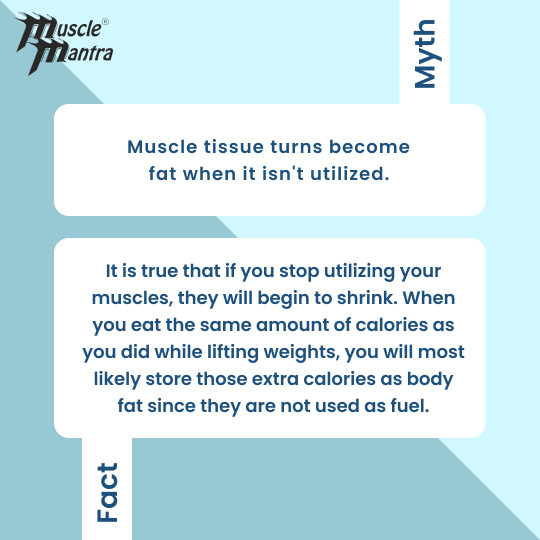
Myth: Muscle tissue turns become fat when it isn't utilized.
Fact: It is true that if you stop utilizing your muscles, they will begin to shrink. When you eat the same amount of calories as you did while lifting weights, you will most likely store those extra calories as body fat since they are not used as fuel.
.
Official website, link below ⤵️
🌐 www.musclemantra.com
.
.
For more information:
📞 0172 504 5255
.
.
#MuscleMantra#MM#nutrionbrand#indiannutritionbrand#nutritionbrand#mmnutrition#facts#myths#nutritionhalt#haltnutition#supplementbrand#bestsupplement#protein#proteinwhey#mythfact#wheyprotein#wheyproteinsupplements#proteinsupplements#preworkout#postworkout#gymupdates
0 notes
Text
Algues contre viande, infections sportives et manque de protéines
NOUVEAU PODCAST 👉 Algues contre viande, infections sportives et manque de protéines
Dans cet épisode, nous allons parler de remplacer la viande par des algues, des infections causées par le sport et du manque de protéines dans la diète moderne.
**NOUVEAU** Les particularités de la musculation à partir de 50 ans
Sommaire :
Des algues pour remplacer la viande
Le sport protège-t-il des infections ?
Aliments transformés et protéines ?
Les particularités de la musculation à…
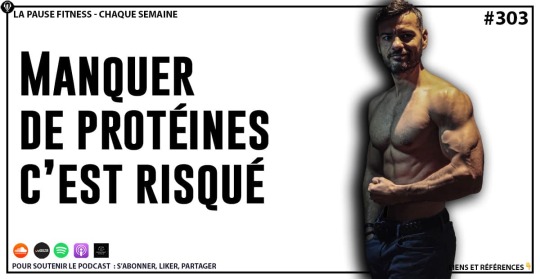
View On WordPress
#besoins en protéines#fitness podcast#la vérité sur les protéines#nutrition#nutrition coaching#nutrition myths#nutrition program#nutrition sportive#podcast#pre-workout nutrition#protein#protéine#proteine en poudre#protéine musculation#protéines#protéines en poudre#protéines musculation#protéines végétales#sports nutrition
0 notes
Text
In the current epidemic of rich Western women who cannot “choose” to eat, we see the continuation of an older, poorer tradition of women’s relation to food. Modern Western female dieting descends from a long history. Women have always had to eat differently from men: less and worse. In Hellenistic Rome, reports classicist Sarah B. Pomeroy, boys were rationed sixteen measures of meal to twelve measures allotted to girls. In medieval France, according to historian John Boswell, women received two thirds of the grain allocated to men. Throughout history, when there is only so much to eat, women get little, or none: A common explanation among anthropologists for female infanticide is that food shortage provokes it. According to UN publications, where hunger goes, women meet it first: In Bangladesh and Botswana, female infants die more frequently than male, and girls are more often malnourished, because they are given smaller portions. In Turkey, India, Pakistan, North Africa, and the Middle East, men get the lion’s share of what food there is, regardless of women’s caloric needs. “It is not the caloric value of work which is represented in the patterns of food consumption” of men in relation to women in North Africa, “nor is it a question of physiological needs…. Rather these patterns tend to guarantee priority rights to the ‘important’ members of society, that is, adult men.” In Morocco, if women are guests, “they will swear they have eaten already” or that they are not hungry. “Small girls soon learn to offer their share to visitors, to refuse meat and deny hunger.” A North African woman described by anthropologist Vanessa Mahler assured her fellow diners that “she preferred bones to meat.” Men, however, Mahler reports, “are supposed to be exempt from facing scarcity which is shared out among women and children.”
“Third World countries provide examples of undernourished female and well-nourished male children, where what food there is goes to the boys of the family,” a UN report testifies. Two thirds of women in Asia, half of all women in Africa, and a sixth of Latin American women are anemic—through lack of food. Fifty percent more Nepali women than men go blind from lack of food. Cross-culturally, men receive hot meals, more protein, and the first helpings of a dish, while women eat the cooling leftovers, often having to use deceit and cunning to get enough to eat. “Moreover, what food they do receive is consistently less nutritious.”
This pattern is not restricted to the Third World: Most Western women alive today can recall versions of it at their mothers’ or grandmothers’ table: British miners’ wives eating the grease-soaked bread left over after their husbands had eaten the meat; Italian and Jewish wives taking the part of the bird no one else would want.
These patterns of behavior are standard in the affluent West today, perpetuated by the culture of female caloric self-deprivation. A generation ago, the justification for this traditional apportioning shifted: Women still went without, ate leftovers, hoarded food, used deceit to get it—but blamed themselves. Our mothers still exiled themselves from the family circle that was eating cake with silver cutlery off Wedgwood china, and we would come upon them in the kitchen, furtively devouring the remains. The traditional pattern was cloaked in modern shame, but otherwise changed little. Weight control became its rationale once natural inferiority went out of fashion.
— Naomi Wolf (1990) The Beauty Myth
#hunger#long post#naomi wolf#the beauty myth#radblr#radfem#radical feminism#radfem safe#radical feminist safe#!!!
745 notes
·
View notes
Text
फिटनेस दुनिया की 21 अफवाहें जिन पर आपको विश्वास करना बंद कर देना चाहिए (21 Common Fitness Myths You Should Stop Believing)
फिटनेस दुनिया की 21 अफवाहें जिन पर आपको विश्वास करना बंद कर देना चाहिए (21 Common Fitness Myths You Should Stop Believing)
क्या लगातार अपने शरीर में विकास करना संभव है? (Fitness Myths)
क्या ज्यादा पसीना निकलने से मोटापा जल्दी कम होता है?
क्या लगातार आकार, शक्ति या माँसपेशियों के रूप को बेहतर बनाना संभव है?
क्या महिलाओं को वजन से व्यायाम नहीं करना चाहिए?(Fitness Myths)
(more…)

View On WordPress
0 notes